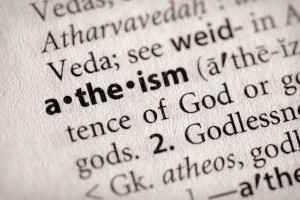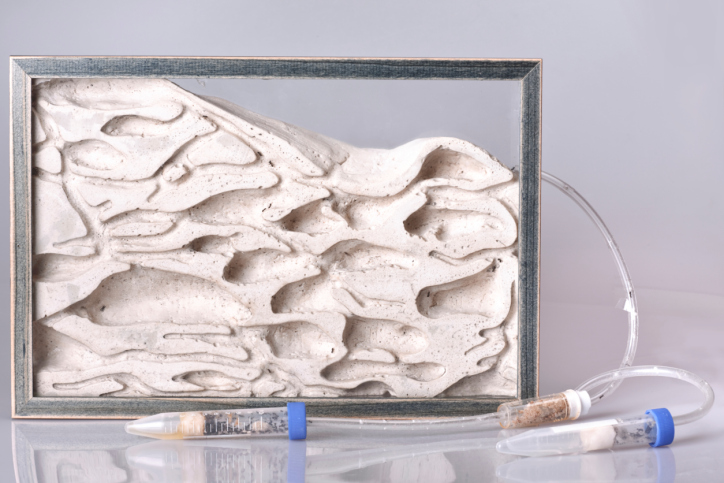(To see the related destruction of theism, go here)

If you read the de-conversion stories of atheists, many started losing their faith in religion and the supernatural because they realized the universe seems to function without divine intervention. If you don’t need a god to explain the resting position of a golf ball, why would you bother adding one into your belief system? We don’t need to believe in gods to understand why lighting happens, even if lightning strikes in statistically anomalous places.
In a seemingly contradictory fashion, I am going to argue that the atheist counter-argument to theism-from-mathematics is actually misguided. While theists wrongfully add god into the equations where he does not need to be (and they do this all the time), atheists wrongfully subtract god from the equations where he does need to be. Warning: there may be repetition in this post, as I want to give a few examples and will have to use numerous, slightly differing sentences to explain this idea. So, hang in there. It is worth it.
Example 1: Take the golf example (if you haven’t read that post, read it before continuing). So, you set up for a shot off the tee, and just before you swing, I rudely interrupt and ask you two questions:
Question 1: What is the probability that the golf ball will land on specific blades of grass after you swing?
Answer: The probability is 100% (assuming you don’t hit the ball into the parking lot). It is necessary. You don’t know the specific blades onto which the ball will rest, but you can know that after you swing, it will lay on some blades somewhere.
 Question 2: What is the probability that the orange will land on specific blades of grass after you swing?
Question 2: What is the probability that the orange will land on specific blades of grass after you swing?
Answer: The orange? What orange?
Case closed. No argument for atheism can stand up to that thorough destruction.
(Just kidding.)
OK, here’s the point of the golf example: given the structure, we know that a statistical anomaly will happen (the golf ball resting on specific blades of grass). We also know that there is a 0% chance of an orange landing in the middle of the fairway, given the structure. The starting structure does not involve any oranges, so an orange can not end up being struck by the golf club.
Why is this important? When an atheist argues that our earthly existence is necessary (because the universe is so enormous, or because there are multiple universes which allow for a huge data set), they are making the same mistake. It is both a structural and chronological mistake.
Let’s say that our universe’s existence is statistically necessary if there are infinite universes. That still does not actually give us the final answer about how the universe exists.
What are the chances that the structure of the universe (or multiverse) would exist which allows for statistical anomalies in the first place? Where did the data set itself come from? What super-structure was in place which allowed for the creation of this universe? It is a chronological mistake to start from a situation where any laws of the universe (or multiverse) already exist.
From what structure should you start? Indeed, a universe spontaneously self-created ex nihilo is impossible for the same reason we know the orange won’t land in the fairway. The super-structure would not exist which could allow for creation (by definition). Atheists might be correct in arguing that there is a multi-verse which creates universes (though I doubt it), but that simply kicks the can back one step: what are the chances that the super-structure of the multiverse would exist? By what super-super structure is that possible?
Non-existence can not result in existence, for structural reasons. No orange will ever land in the fairway without the appropriate starting structure.
Example 2: Pick a number one in a million. Which number did you pick? 554,264? Wow, that’s a one in a million chance! We don’t need a god to explain that right? In fact that one-in-a-million chance was necessary. Not so fast.
One in a million chance actually means one in a million. Where does the one come from? We treat the “one” as an assumption, a premise. Where in the world does it come from? What is the chance that “one” in a million would necessarily be “one”? Where does the structure come from? Or, more precisely, what structure was in place which allowed the one in a million chance to occur? When you say one in a trillion, you are asserting, not explaining, “one”.
The novelty of statistical anomalies is almost explained away by just expanding your data set. If the data set is infinite, of course this universe must exist. But this reasoning still does not explain the existence of the data set in the first place. There must have been a structure in place which allowed the statistical anomaly, and that cannot logically be explained away just by shouting “times infinity”. I know, I keep saying the same thing over and over, just in slightly different ways. Bear with me.
Well, all this structural talk naturally leads to the question, “where does structure come from?”
The atheist might argue for example, “the intricacies of an ant hill, with all the passageways and tunnels, naturally arise without intention or divine intervention”.

This is only half-true. The structure of an ant farm depends on a deeper structure. You absolutely must have the necessary ingredients in place, and organized in the right way, in order for that structure to exist. You need dirt, ants, gravity, atoms, the all laws of physics, time, etc.
“All you need is dirt, ants, and time. Nothing special. In fact, it is almost a necessary structure which arises from natural processes.”
It is a chronological problem to argue that you can fully explain the complex structures inside an ant hill with such unexplained and dependent categories as “ant” and “dirt”. Where in the world did those ingredients come from? The premise of this atheist argument is an unexplained assertion (“Planet earth must exist because the laws of the universe or multiverse make it statistically necessary”). Naturally, we should doubt the conclusions that follow from unfounded, asserted premises and seek deeper explanation.
So, we need to modify our question. We should ask, “How came the deepest structures into existence? Can there ultimately be structures which do not depend on larger structures?”
Well, what do the structures of golfing and number-picking have in common? Their origin: rational agency. Where did the “one” in a trillion come from? Us. We set up the structure for the “one in a trillion” anomaly. Without us, no number could have been picked. A mind was the necessary super-structure to create the sub-structure of golf.
There seems to be a tight connection, as far as we know, between structure, intention (purpose), and creation. Does this mean there is a mind behind the super-structure of the universe? Could be. I don’t know how a mindless, intentionless, causeless super-structure came into existence. Could it be “chance”? I doubt it. “Chance” seems to only apply to existing structures. (What is the chance of any given event happening [a golf ball landing where it does]? It completely depends, almost by definition, on the structure.)
So, to be clear, within a structure, you don’t need a god to explain anything. Does that explain away all typical “miracles” (which are really just memorable statistical anomalies)? Probably. Adding a god doesn’t have any significant explanatory power. I side with Occam and don’t bother adding god to the equation. But don’t make the chronological mistake and end your questioning there.
The atheist must now respond, “Then these structures must have always existed. Time absolutely must be infinite. The super-structure(s) must stretch back infinitely.” That would seem to answer the structural problem. Unfortunately, it runs right into the chronological problem again.
For the logician, my intention is to show the following:
If atheism, infinite timeline. (this post)
There is no infinite timeline. (next post)
Therefore, not atheism. (next post)

Pingback: One destruction of theism | one free mind
Pingback: Why I am not an atheist | one free mind